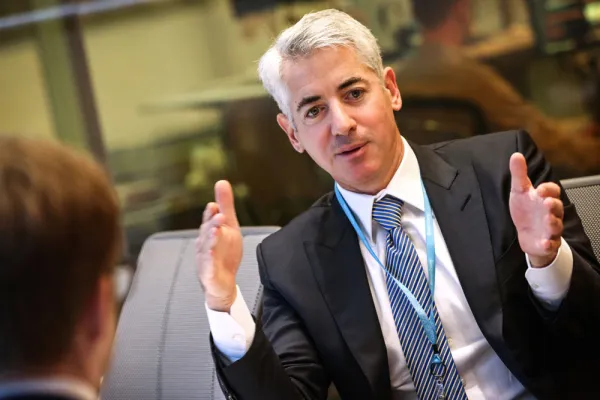
Illustration by Leonardo Santamaria
On Wednesday, March 25, a week after the Federal Reserve had stepped in to stabilize credit markets, J.P. Morgan banker Keith Canton called Reed Rayman, an Apollo private equity partner who focuses on technology investments, including e-commerce and online travel.
Canton knew that Barry Diller, the chairman of Expedia, had already drawn down his company’s revolving credit lines. Now Diller, who had forced out Expedia’s CEO and CFO in December over strategy disagreements, needed even more cash to make good on a possible $5 billion in refunds the online travel company owed to customers.
On the phone, Canton told Rayman — who was working from home with two toddlers and no childcare — that Expedia needed a term sheet for up to half a billion dollars in ten days. Canton thought Apollo would finance the sheet despite never having invested in the company.
Two days later, Canton, who runs private capital markets for J.P. Morgan, called Rayman again. Sean Quinn, the chief financial officer of Cimpress, had a different issue from Diller’s. He didn’t have liquidity problems, but he needed money so the company wouldn’t be forced to break the terms of loan contracts with a group of banks. Rayman, who was on the board of photography company Shutterfly, knew Cimpress well. The business, which owns Vistaprint and has 15 million global small business customers, was pure Apollo. Dog walkers used the low-cost printer for business cards to leave at the counters of local diners, and restaurants had Cimpress print menus that it could send home with customers’ take-out orders.
Rayman and James Zelter, who has built up Apollo’s credit business over the past 13 years from $20 billion to $240 billion, thought they could provide some of the financing to the companies — which didn’t want to give up control — with money from a fund called Hybrid Value. The fund is essentially half private equity, half credit, an option that didn’t exist during the last crisis. With Hybrid Value, Apollo, known for the grip it has on its investments, doesn’t get control. But companies can get custom financing and a strategic partner.
Apollo quickly assigned staffers from its private equity, credit, and Hybrid Value teams to the Expedia deal. Over the weekend of April 21 and 22, David Sambur, co-lead of private equity at Apollo, and Greg Mondre, co-CEO of private equity firm Silver Lake, decided to partner on a $1.2 billion deal for perpetual preferred stock. Apollo was also an anchor investor in a follow-on bond deal.
It’s an unusual partnership. Silicon Valley–based Silver Lake, which recently invested billions in Twitter, Alphabet’s Waymo, and other companies, is a growth investor in technology and other sectors. Apollo is a hard-core value investor. Mondre and Sambur now sit on Expedia’s board.
Apollo, on the other hand, was the logical pick to finance Cimpress, whose small business customers were shuttered. Cimpress CFO Quinn had been early in preparing the company for a Covid-19 shutdown. In late February he talked daily to the CEO of Cimpress’s business in Italy, where, by the last weekend of the month, demand had dropped by 80 percent. Cimpress, which had $2.8 billion in annual revenues, had large revolving credit lines to tap, but Quinn hoped to get ahead of debt covenants and make sure the company had flexibility with lenders so it could play offense against weaker competitors.
With Cimpress’s stock price gyrating, Quinn didn’t want to dilute shareholders. The company also didn’t want a lender to take a board seat. Instead, on April 28 the company finalized the details of a $300 million note at 12 percent, with warrants for 4 percent of the company. Even though high-yield debt markets had opened back up as the deal progressed, Quinn believed they could close up anytime and liked the certainty of a transaction with Apollo. As for Apollo, it traded call protection for equity warrants, something the company couldn’t have gotten in a traditional bond deal.
With everything done remotely via apps like Zoom, no one knew that Quinn was working with Covid-19. On March 14, the day he first called Canton, he ate at a small Italian restaurant near his Redding, Massachusetts, home. He and seven other diners soon contracted the virus.
The heroes, financially speaking, will also be different.
Markets had been relatively calm for the 11 years leading up to March, with a few notable exceptions. But March was the first true test of a fundamental transformation of the structure of Wall Street, as asset managers — particularly alternative credit shops — have filled the void left by banks in the wake of 2008.
In 2008, Warren Buffett was the savior for companies facing crisis, famously lending money to Goldman Sachs and other big banks as they faced extinction. At the time, Apollo couldn’t do those deals: It was still primarily a distressed investor, and Zelter was at the very beginning of building out the firm’s credit arm.
But this time around, it has been firms like Apollo that are extending lifelines to companies like Expedia and Cimpress, as well as to businesses as varied as United Airlines and grocery store Albertson’s. Zelter had been preparing for this crisis for a decade, building capabilities across the board, including capital solutions, distressed, and large-cap loan origination.
Credit has changed Apollo’s profile. The vast majority of the firm’s credit is performing — meaning it’s healthy. “We’ve always been known as a distressed or stressed firm, [but] 80 percent of what we’re doing in credit is not that. It’s capital solutions, it’s providing capital to great companies and helping them either deal with a stressful situation or grow,” said Apollo co-founder Josh Harris during a first-quarter earnings call.
(Apollo isn’t alone in being able to write big checks. Blackstone, Bain Capital, Sixth Street Partners, Silver Lake, and other firms also have plenty to invest.)
“Expedia is an investment-grade company and great American success story hit by a crisis. We’re well known as a PE firm,” says Zelter in an interview with Institutional Investor. “But here’s a comparison: What Warren Buffett did with Goldman, BofA, GE — we’re offering those same services for some great investment-grade companies.”
Apollo spent approximately $50 billion, mostly from the credit business, in the first quarter of this year. Troubled companies had access to other sources of cash, but many didn’t want the restrictions that might come with government loans and many weren’t large enough, or didn’t have good enough credit, to qualify. Others could have tapped high-yield markets once they opened up again in April, but many were willing to pay the higher rates that come with private credit deals for a chance at negotiating terms and for the certainty that a deal would close.
In contrast to some competitors that have opened their wallets more slowly, Apollo, with its aggressive layout of cash, is betting on the macro environment and on governments not abandoning markets. The firm’s house view is a rosy one: People will quickly return to normal patterns, such as staying in hotels, hopping on planes, and eating in restaurants, Apollo believes.
Zelter points out that, unlike in 2008, markets have moved at a dizzying speed and opportunities have popped up and then disappeared. From an investing perspective, Zelter considers Phase I to have been the early dislocation that took place in March, when markets were in free fall as everyone raced for cash to prepare for a doomsday scenario.
March saw Apollo quickly pour money into high-quality credit securities whose prices were cut in half as buyers vanished. Zelter and John Zito, co-head of global corporate credit, had created the strategy — called Accord — in 2015 to invest in opportunities that they thought would arise because of market structure problems. “Given the exponential growth in credit markets and in passive [investing] since the financial crisis, when there’s volatility like we saw in March, there’s no natural buyer of the asset class,” says Zelter.
In March, Apollo’s third Accord fund still had most of its cash available when markets started south. The firm called capital and was fully invested within seven days.
“This is about liquidity-driven dislocations. If you go back to the dark days of March, we quickly drew down capital and executed,” Zelter notes. That opportunity is over, at least for now.
Phase II, according to Zelter, was in April, when the capital markets hadn’t yet bounced back but governments around the world had signaled support for markets. It was the time for capital solutions for good companies having temporary problems, he says. That too is over.
Zelter says Phase III, which started in early May, is distressed. Companies will now have to climb out of the economic downturn, and not all will make it. That’s where the market is now, he believes.
Apollo has proven them wrong.
“We quickly became one of the largest buyers in investment-grade; we were active in high-yield, loans. We had capital that we could draw down. We were on offense on day one,” says Zelter.
Now the firm needs to top up its coffers. It aims to raise $20 billion across credit, including capital solutions, hybrid value, dislocation, origination, stressed, and distressed.
Apollo will have to gather a lot of that money over Zoom. Although cities, including New York, have slowly been opening up, asset managers and investors haven’t been rushing to return to their offices. Many top executives have found working remotely, even with kids talking to them from the sidelines of tough Zoom negotiations, to be more productive.
The virtual meetings are working. When Apollo approached Christian Hensley, senior managing director of equities and credit at the Investment Management Corp. of Ontario, about putting money into Accord, the Canadian pension manger was ready. Despite having its entire staff working from home since mid-March, IMCO ponied up $250 million. The company wasn’t alone.
Later that month, just as it was remotely putting the remaining cash from Accord III to work, Apollo started to raise an additional tranche of the fund.
The haul: $1.75 billion in eight weeks.





